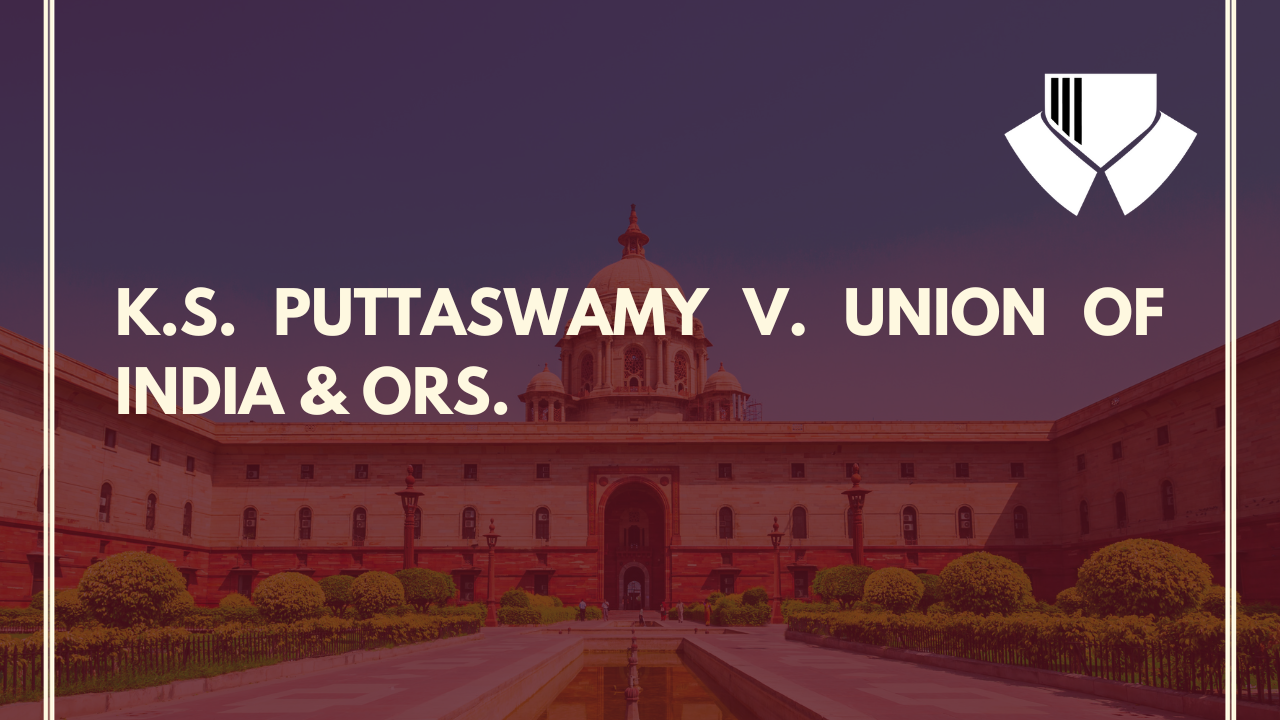This case analysis is written by Nidhi a BA LLB (H) student from Institute of Law, Kurukshetra University, Kurukshetra
Citation: Writ Petition (Civil) No. 494 of 2012, (2017) 10 SCC 1
Court: Supreme Court of India
Date of Judgement: 24th August, 2017
Bench: Sanjay Kishan Kaul, Dhananjaya Y. Chandrachud, R. K. Agrawal, J. S. Khehar, S. A. Bobde, S. A. Nazeer, R. K. Agrawal, J. Chelameswar, A.M. Sapre JJ
Facts of the case:-
In 2012, a retired High Court Judge, Justice K.S. Puttaswamy, filed a writ petition in the Supreme Court of India challenging the constitutionality of the Aadhaar project. This challenge was primarily based on the argument that Aadhaar violated the right to privacy, as it had become mandatory for various essential activities such as filing tax returns, opening bank accounts, securing loans, buying and selling property, and making purchases of 50,000 rupees or more.
The case centered on the government’s Aadhaar scheme, which was a biometrics-based identity card system proposed to be made mandatory for accessing government services and benefits. On August 11, 2015, a three-judge Bench heard the challenge and ordered that the matter should be referred to a larger Bench of the Supreme Court. Subsequently, on July 18, 2017, a five-judge Constitution Bench ordered that the matter be heard by a nine-judge Bench.
Issues:-
- The primary question was whether the Aadhaar Project violated the right to privacy of Indian citizens and was therefore unconstitutional.
- Whether the right to privacy was a fundamental right under Article 21 of the Indian Constitution, which guarantees the right to life and personal liberty?
- Whether the Aadhaar Act’s provisions mandating the linking of Aadhaar with mobile numbers, bank accounts, and school admissions should be struck down?
Contentions:
By the Petitioner:
- The petitioner contended that the right to privacy was an integral part of the right to life and personal liberty, and any restrictions imposed on it should be in accordance with the procedure established by law.
- The classification based on religion was seen as discriminatory, and compelling individuals to disclose their religion was argued to be a violation of Article 25 of the Constitution.
- The linking of bank accounts with Aadhaar was claimed to violate the rights of citizens guaranteed under Article 14 (equality before the law) and Article 21 (right to life and personal liberty).
- Concerns were raised regarding the power of the UIDAI to cancel Aadhaar numbers without a robust redressal mechanism, potentially depriving individuals of essential services.
- The petitioner argued that Aadhaar violated the principles of proportionality and the rule of law, as lacking an Aadhaar card could potentially lead to the erasure of an individual’s existence.
- They also raised concerns about the classification of the Aadhaar Act as a money bill, which bypassed the scrutiny of the Rajya Sabha and limited the President’s power to send the bill back to Parliament for reconsideration.
By the Respondent:
- The respondents emphasized that only minimal information was collected during Aadhaar enrollment, primarily demographic data such as name, date of birth, address, gender, mobile number, and email address. They argued that this information was often in the public domain.
- Section 2(k) of the Aadhaar Act explicitly prohibited the inclusion of sensitive information such as race, religion, caste, tribe, ethnicity, language, records of entitlement, income, or medical history.
- The government claimed that Aadhaar had positive implications for various welfare schemes and subsidies, including those benefiting workers under the Mahatma Gandhi National Rural Employment Guarantee Act (MGNREGA) and pensioners.
- They argued that Aadhaar-enabled Direct Cash Transfer (DCT) systems would enhance efficiency, reduce transaction costs, and minimize leakages in government subsidies and services.
- The Unique Identification Authority of India (UIDAI) assured that the data collected was secure and encrypted, and all biometrics were stored on government servers with robust security standards.
- The Aadhaar Act regulations allowed for the omission or temporary deactivation of an individual’s Aadhaar number by the UIDAI.
Judgment:
The key principles established by the judgment were as follows:
- Legislative Aim: The law should aim to achieve a legitimate state objective, and the proposed action must be necessary for a democratic society’s legitimate aim. This principle emphasized the need for a valid purpose behind any intrusion into privacy.
- Proportionality: There should be a rational connection between the objectives sought to be achieved and the means adopted to achieve them.
- Legality: The existence of a law was a prerequisite for any state action that involved privacy concerns.
- Procedural Guarantees: Adequate procedural safeguards should be in place to prevent the abuse of state interference.
- The unanimous verdict declared that privacy was an integral component of Part III of the Indian Constitution, which outlines the fundamental rights of citizens. The court emphasized that fundamental rights could not be granted or taken away by law and must always comply with the Constitution. Additionally, the judgment clarified that the right to privacy was not absolute, and any infringement by the state or non-state actors must satisfy a triple test.
- The decision in M.P. Sharma vs. Satish Chandra and Kharak Singh vs. State of UP, to the extent that it held that the right to privacy was not protected by the Constitution, was also overruled.
- The court ruled that Aadhaar cards could be made mandatory for availing the benefits of welfare schemes and subsidies provided by the government for the empowerment of the poor.
- The judgment clarified that commercial banks, payment banks, e-wallet companies, and telecom companies could not request Aadhaar details from customers when issuing new SIM cards. Additionally, schools were prohibited from requiring students to provide their Aadhaar numbers for board exams or admissions.
Conclusion:
The Supreme Court’s judgment in the Aadhaar case reaffirmed the fundamental right to privacy under the Indian Constitution while also acknowledging the potential benefits of Aadhaar in government welfare schemes. It established a robust framework for evaluating privacy concerns in the context of state actions, emphasizing the need for a legitimate purpose, proportionality, legality, and procedural safeguards.


